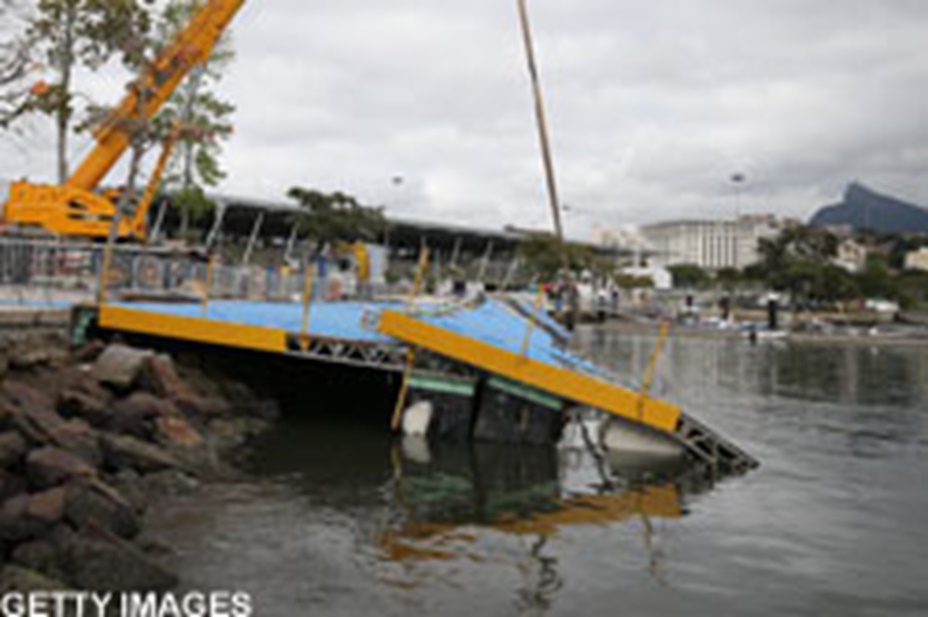When the Rio Games open Friday, organizers "hope the spotlight will finally shift from the problems engulfing the city to the field of play," after the "volume and seriousness of Rio's troubles have dominated the conversation leading up to the Games," according to Rachel Blount of the Minneapolis STAR TRIBUNE. USOC CEO Scott Blackmun said he feels "very, very good" about Brazil's ability to conduct a safe and successful Olympics. Blackmun: "It's a complicated world, and there is risk associated with everything. We're excited to go down there. And like any other Games, our expectation is that when the opening ceremony comes on August 5, we're all going to be focused on that." However, some teams last week "arrived at the athletes' village and found unfinished or dirty apartments, with substandard plumbing and electrical work." On Saturday, the main ramp of Marina da Gloria, the Rio sailing venue, "partially collapsed, raising more questions about the quality of construction overall." Brazil's government has said that 85,000 police and military personnel will be "protecting the estimated 500,000 people visiting for the Olympics." Blount noted other countries are "pitching in," including the U.S., which is "training some Rio police." Blackmun said, "The safest place in the world is going to be the (athletes') village and the competition venues" (Minneapolis STAR TRIBUNE, 7/31).
PROBLEMS KEEP PILING UP: USA Today's Nancy Armour noted other Olympic hosts "have had one problem, maybe two," leading into the start of the Games. Armour: "Rio has five or six" ("OTL," ESPN, 7/31). In Miami, Linda Robertson notes no Olympic host city has "confronted the list of crises pummeling Rio." The news out of the city "reads like a black comedy" (MIAMI HERALD, 8/1). In Jacksonville, Gene Frenette wrote if the late former IOC President Juan Antonio Samaranch was still in charge, he "would be changing his traditional words at the closing ceremony from "'the best ever Games' to, at least leading up to the 2016 Olympics, the worst nightmare" (FLORIDA TIMES-UNION, 7/31). In N.Y., John Branch notes when Rio won its bid in '09, official documents promised that 80% of the sewage that flowed into the Guanabara bay "would be treated by the start of the Games." But today, officials "promise only that the water will be clean enough for competition" (N.Y. TIMES MAGAZINE, 7/31 issue). In Raleigh, Luck DeCock writes the run-up to the Rio Games has made the '14 Sochi Games "look like" the '96 Atlanta Games by comparison. For two years, the "steady stream of bad news has flowed out of Rio like raw sewage into Guanabara Bay." However, this "isn't the first Olympics to take things to the wire." There is "always enough last-minute intervention to get things on track." DeCock: "Typically, and this is assuredly the case in Rio, enough money will be thrown at these problems by the time the games open officially" (Raleigh NEWS & OBSERVER, 7/30).
CHANGE OF FOCUS: In Boston, Shira Springer wrote if "big names in their respective sports perform as expected, then many, if not all, troubles plaguing Brazil and Rio Games will be pushed aside until the Olympic flame is extinguished." But with reports of new problems "surfacing daily, it becomes increasingly difficult to shift into sports celebration mode and appreciate the history to be made in Rio." It "doesn't help when those reports include a mutilated body washing up near the beach volleyball venue, the troublingly late hiring of Olympic security screeners, and an Athletes Village initially deemed uninhabitable by some national teams" (BOSTON GLOBE, 7/30). In San Diego, Mark Zeigler writes there is "hope" for the Rio Games. Zeigler: "Maybe the spirit of global competition, maybe the virtues of humanity, maybe the exultant ideals of Olympism can prevail again. Maybe the athletes can bail out Rio. Because somebody has to" (SAN DIEGO UNION-TRIBUNE, 7/30
BE CAREFUL WHAT YOU WISH FOR: In N.Y., Carly Carioli writes the Olympics are "seen as an opportunity to shine on the world stage and a financial prize to be reaped." But they are also an "incredibly risky investment." Cities are "forced to sign agreements promising extraordinary fiscal and regulatory power to Olympic organizers and to pick up the tab if the production goes overbudget, which it often does" (N.Y. TIMES MAGAZINE, 7/31 issue). In Boston, Bob Ryan wrote the Olympics have "become far too costly," and it is not "far from the truth to say that no one wants" the Winter Games. The IOC in choosing its host for the '22 Games was left with a choice between the "brutal totalitarian government of Kazakhstan" and Beijing, a city that is "not exactly known for its winter climate, and which, yes, is not exactly a model of democracy." Ryan: "We are being asked to swallow the notion that 2008 Summer Games host Beijing is a suitable place for the 2022 Winter Games. Really?" Rio "seemed like a great idea" for the Games when it won its bid seven years ago. But the "last thing Brazil needs" in '16 is the Olympics. Ryan: "I suspect current 2024 Olympic bidders Budapest, Paris, Rome and our own Los Angeles will be watching closely. I think the future of the entire Olympic movement is at stake. The Olympics could collapse under their own weight" (BOSTON GLOBE, 7/31).




